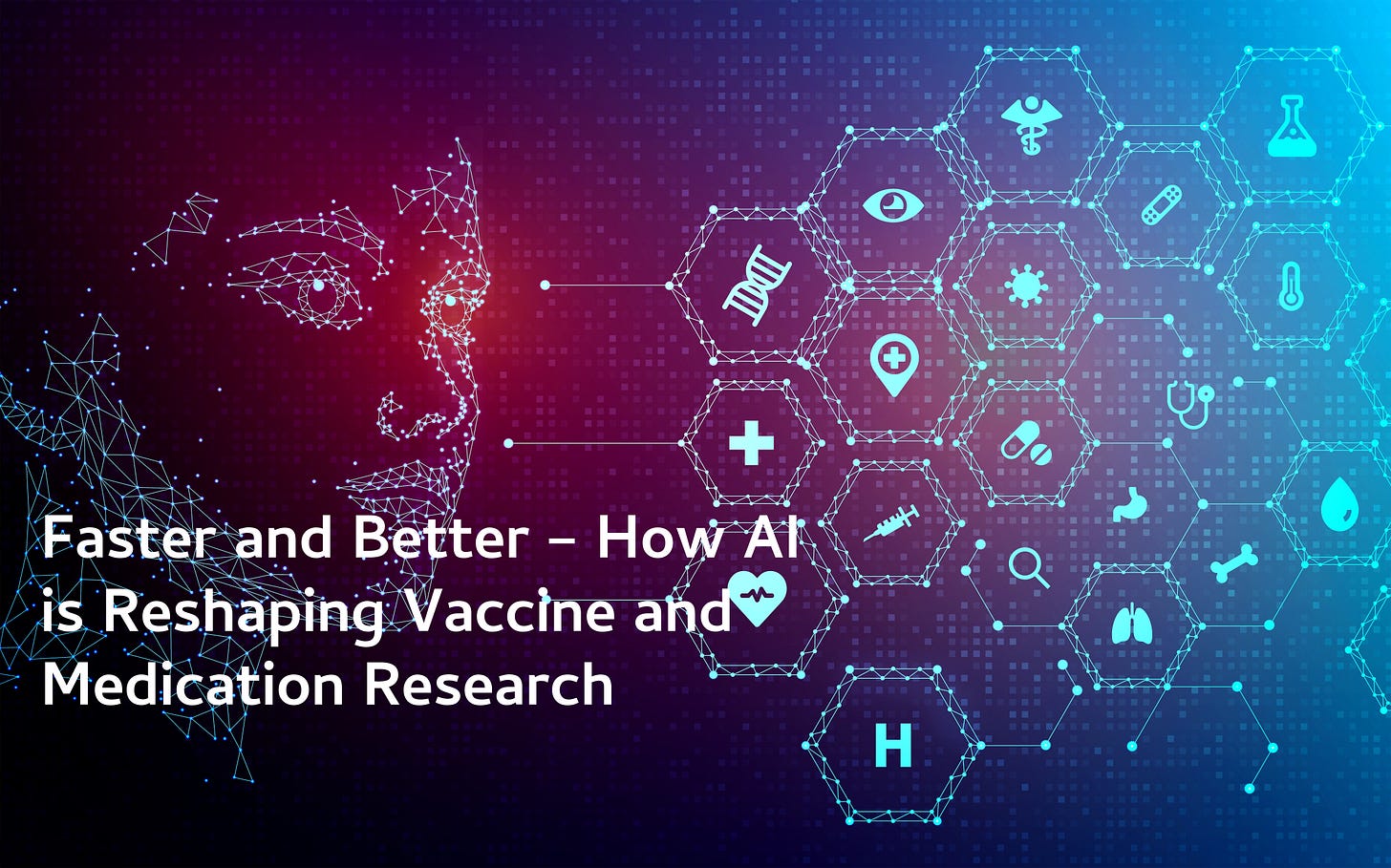Faster and Better – How AI is Reshaping Vaccine and Medication Research
At last month’s UN General Assembly Meeting in New York, world leaders and experts sounded alarm bell after alarm bell that we have missed all the targets countries have set themselves on health and development. Yet, few proposals were suggested for radically reshaping the strength of our health systems and our progress in global health.
There is, however, one that has potential from laboratory to patient.
Overall, health systems aim to meet 4 targets: improve population health, improve patient’s experience of care, enhance caregiver experience, and reduce the cost of care. Artificial Intelligence (AI) promises to increase the efficiency of care as systems strive towards these goals. AI can help in a multitude of ways, spanning from improved data analytics, to detailed individual health metrics tracking.
AI is capable of helping the research & development process of medication. It does so by assisting in pharmacological testing, improving our abilities to assess new drug combinations and how effective they are at reaching their intended target. For example, AI has been able to drastically improve our understanding of drug toxicity. We can now better predict drug toxicity and the specific effect they will have before drugs make it to expensive clinical trials and are tested on humans. Using complex mathematical models, scientists are able to mimic neural networks in the human brain and predict how the drug creates those toxic effects. This makes drug testing more efficient, lower cost, and decreases the amount of animal testing that is necessary as we lean more towards computer modeling. Overall, this has major implications on personalized medicine as with more efficiency comes more opportunity to innovate and specialize with our complex understanding of chemical compounds and drug side effects.
Companies such as Atomwise are revolutionizing the field of healthcare with their innovations. Founded in 2012, the company is reducing the cost of developing medications by using deep learning to predict which molecular combinations will work. It currently has two programs in lead-optimization, and projects in immunology and oncology in discovery stages.
But AI is not new in healthcare. We have even seen health AI in our everyday lives through health metrics taken by phones or watches. Individuals are now able to better understand and passively track their own personal health data by seeing how many steps they take per day, their heart rate trends, and more. Along with this comes active tracking, made simpler by the use of technology. This includes tracking food intake, logging workouts, or even logging how many glasses of water you drink in a day. These seemingly minimal things can have a major impact on understanding and managing our own personal health.
The drug development process is not the only place in health where AI and a deep digital data layer can have an impact. Of course, the most effective vaccine or drug development process in the world means little if the product does not make it to the patient and get injected. So far, relatively little funding has gone into research and innovation when it comes to delivering medications to complex geographical regions or increasing overall access to healthcare, as has been started with drone delivery. AI is optimizing the supply chain, particularly through its improvements in management. It is able to better predict demand, make quick and calculated decisions, and overall improve output. Certainly, the future of vaccine and drug delivery will use digital packaging solutions such as RFID chips even at the level of individual doses, coupled with AI tools to track vaccines and medicines from the “factory to the patient.” This is a key area of development for companies concerned with delivering to the last mile like ApiJect.
Merck, one of the world's leading science and technology companies, uses AI, machine learning, sensors, and analytics to optimize and automize their supply chain. This has led them to synchronize a decrease in inventory with specific drug cycle times. Meaning when a drug is ready to be distributed, their supply levels are ready to accept more drugs, reducing excess drug production.
Efforts to incorporate AI into healthcare have seen challenges, especially in the area of integrating AI into business processes. Often AI is seen as a replacement, when in reality it should be used adjacently with current methods. Incorporation of AI should take into account local operations, ethics, and work in combination with the current healthcare system to enhance care, rather than replace it. This will help lead to more individualized, efficient, human-centric care. Through the stages of development, it's crucial to involve a variety of stakeholders, such as health providers and those who receive treatment. AI also requires highly skilled workers who need to be kept on at a maintainable price. Finally, there are serious considerations and security precautions that need to be put in place to protect against data breaches and ensure cybersecurity. We must continuously evolve our laws and regulations on AI as it becomes more and more relevant in society today. This means considering such questions as, what is to be done with health data, such as step counts and heart rate trends. Will it remain as a personal health tracking system or be shared with others? Medical Professionals? Insurance Companies?
If we remain adaptive and considerate, AI offers real promise for a better, more personalized, and equitable, global healthcare system.






